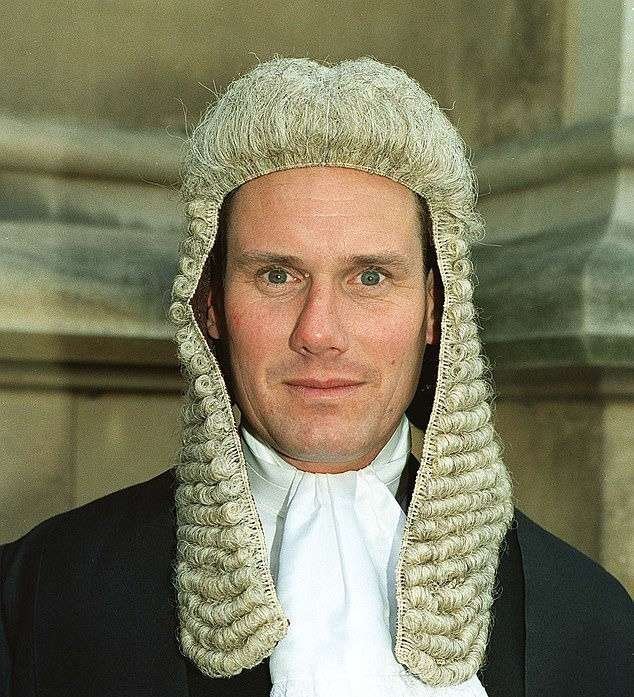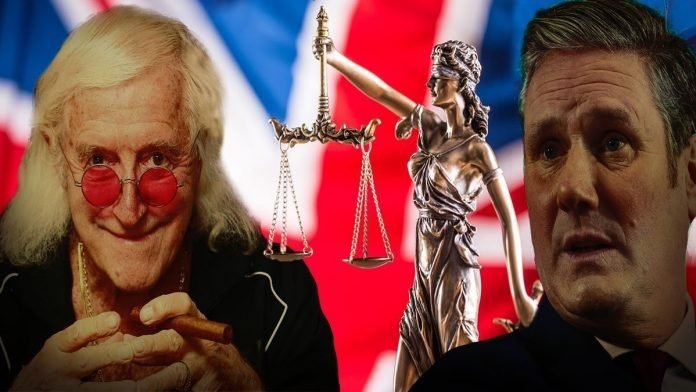With the furore over Sir Starmer’s involvement with the Jimmy Savile case only intensifying, Dr Phil Bevin of the Workers Party looks at some of the known facts.
Keir Starmer has questions to answer over why Jimmy Savile wasn’t prosecuted for his grotesque crimes in 2009. The mainstream media and political responses to Boris Johnson’s suggestion that the Labour Leader was responsible for the failure to prosecute Saville while in post as DPP have been predictably bizarre. Instead of a detailed consideration and analysis of the known facts, which we might expect in a functioning democracy, the accusations have been met with an almost blanket denial.
Hacks in the Guardian, for instance, have gone further than the known facts of the case allow in saying that the accusations against Starmer are “provably false”. In truth, they are not provably anything because records relating to the decision not to prosecute were destroyed in 2010 (more on this in a bit).
At least one former colleague of Starmer’s has done the usual media rounds to debunk Johnson’s accusation, highlighting that the then Director of Public Prosecutions was not the reviewing lawyer in the case. It is also claimed that it is common practice for less senior lawyers to handle individual cases without direct input from the DPP, or other colleagues. It has also been asserted that Starmer’s former colleagues know for certain that he had no involvement in the case. However, if the operation at the CPS was as siloed as they claim, and they themselves had no involvement in the case, how could they possibly know whether the DPP was consulted or not?
We’re also told that, according to the 2013 Levitt report, commissioned by Starmer to investigate his own CPS, the key decision in relation to prosecution was by local police, who chose not to inform victims that others had come forward and that this was made before Starmer was appointed DPP in 2008. So the argument goes, according to the Levitt report, the final decision on prosecution by the CPS was less important than the initial mistakes made by police. This is to misunderstand what the Levitt report said.

Levitt made clear that the fault did not simply lie with the police. She said, “I have reservations about the way in which the prosecutor reached his decision… On the face of it, the allegations made were both serious and credible; the prosecutor should have recognised this and sought to “build” a prosecution. In particular, there were aspects of what he was told by the police as to the reasons that the victims did not want to give evidence which should have caused him to ask further questions. Instead, he appears to have treated the obstacles as fatal to the prospects of a prosecution taking place. ”
Levitt further concludes that “I have been driven to conclude that had the police and prosecutors taken a different approach a prosecution might have been possible.”
In other words, mistakes were made by police AND the Prosecution Service and the 2009 decision not to prosecute is itself regarded as flawed. The report is clearly not laying all of the blame on decisions made by police before Starmer became DPP.
At least the police kept records. The CPS file was “destroyed” on October 26, 2010, and Levitt was therefore dependent upon records kept by police. The details from the CPS side were not available to her and so she was not able to comment upon them. This is the context for her conclusion that “I have seen nothing to suggest that the decisions not to prosecute were consciously influenced by any improper motive on the part of either police or prosecutors.” Levitt makes clear that “I have been dependent on the material provided by the police to show what documents were seen by the reviewing lawyer and the advice which was given.”
Levitt confirms she was told that the record was deleted “because the decision had been reached that no further action should be taken, for data protection reasons and in accordance with our normal policy, the CMS record was automatically deleted.” However, this may be at odds with the CPS’s Retention and Disposal Schedule (the guidelines for retaining and disposing of CPS files) of the time, which states, “that Advice / discontinued cases where the full file has been provided and no proceedings have taken place or where the case was discontinued before trial” should be retained for “5 years following the date of advice/discontinuance,” not a year and a half, a period which doesn’t fit any of the timelines within the retention schedule in place in 2008. We know from the Levitt report that a “complete” file on Savile was submitted to the CPS on 19th November, so why wasn’t it kept for the 5 years specified by the retention schedule? It’s also noteworthy that Levitt only claimed that she had been “told” that the disposal had been in line with policy, not that she had independently confirmed that it was.
To conclude, this analysis suggests that it has not been proven that Starmer had no personal involvement in the decision not to prosecute Savile. We do know that there were issues with the decision and that the relevant information held by the CPS was destroyed, possibly in violation of the Prosecution Service’s own retention and disposal policy.
This indicates that a new inquiry, fully independent of the CPS, may be in order, if we are ever to get to the bottom of this mystery. This inquiry should specifically investigate whether Starmer as DPP knew of or was consulted on the decision not to prosecute Savile and if the CPS records relating to the case were in fact properly handled in accordance with CPS retention and disposal policy.
Some links:
https://webarchive.nationalarchives.gov.uk/ukgwa/20130703165341/
http://www.cps.gov.uk/news/assets/uploads/files/savile_report.pdf and https://www.cps.gov.uk/sites/default/files/documents/publications/rmmversion2.pdf
Support Independent Journalism Today
Our unwavering dedication is to provide you with unbiased news, diverse perspectives, and insightful opinions. We're on a mission to ensure that those in positions of power are held accountable for their actions, but we can't do it alone. Labour Heartlands is primarily funded by me, Paul Knaggs, and by the generous contributions of readers like you. Your donations keep us going and help us uphold the principles of independent journalism. Join us in our quest for truth, transparency, and accountability – donate today and be a part of our mission!
Like everyone else, we're facing challenges, and we need your help to stay online and continue providing crucial journalism. Every contribution, no matter how small, goes a long way in helping us thrive. By becoming one of our donors, you become a vital part of our mission to uncover the truth and uphold the values of democracy.
While we maintain our independence from political affiliations, we stand united against corruption, injustice, and the erosion of free speech, truth, and democracy. We believe in the power of accurate information in a democracy, and we consider facts non-negotiable.
Your support, no matter the amount, can make a significant impact. Together, we can make a difference and continue our journey toward a more informed and just society.
Thank you for supporting Labour Heartlands












